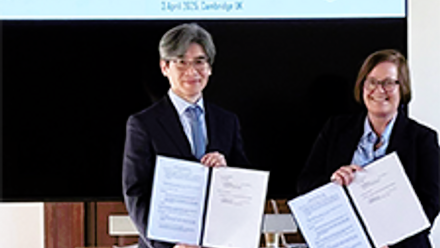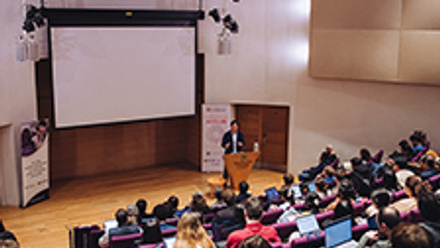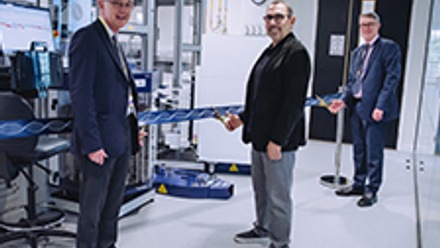Member spotlight: Meet OMass Therapeutics

In this blog, Ros Deegan, CEO of OMass Therapeutics, a member of the BIA Board and a member of the Prime Ministers 2024 Business Council, shares how the company is pioneering new approaches to drug discovery, targeting challenging diseases with their advanced platform. Ros talks about key achievements, including securing funding and progressing towards their first clinical candidate, and OMass's vision for the future. Keep reading to discover Ros' admiration for scientific pioneer Gertrude Belle Elion and her groundbreaking contributions to medicine.
Tell us about your company and ambitions
At OMass, we are developing an exciting pipeline of novel, differentiated small molecules against membrane proteins and intracellular complexes, such as Solute Carriers, GPCRs and Inflammasomes, with a focus on immunological and orphan diseases. Our OdyssIONTM platform utilises native mass spectrometry and other biophysical approaches to interrogate physical interactions in these target ecosystems, improving our probability of success against hard-to-drug targets.
As a company, we are ambitious, and our vision is to become a fully integrated biopharma company with the goal of bringing our own products to market.
What is your company’s biggest achievement so far?
There are probably two things that stand out.
Firstly, I am very proud of the foundation that we have built as a company. We spent a lot of time in our early days deciding on what type of biotech company we wanted to be, what the vision for the company was and what targets we wanted to tackle with our drug discovery platform. That, alongside the amazing scientific progress we had made, allowed us to raise our $100 million series B in 2022 and now hopefully, allows us to deliver on this promise.
The second is the nomination of our first clinical candidate, which will happen later on in the year. This marks a transition point for any biotech company, as you transition from being a research and discovery-only organisation into a research and development company. Drug discovery is hard, some say getting a product approved is as hard as getting someone to the moon, so we like to celebrate these milestones as we get that little bit closer, whilst acknowledging that the hard work is not done!
What are some of the priorities that you’re currently working on?
Our biggest priority at the moment is ensuring that we make a successful transition from a pre-clinical to a clinical-stage company. Our lead program, targeting the MC2 receptor, is expected to enter clinical trials in 2025 so we have started to build the different functions that are needed, including CMC, clinical development, and toxicology amongst others.
The other priority is to continue to advance the other programs in our pipeline, which are just as exciting and not far behind!
What was your motivation behind joining BIA and what are you looking to achieve?
Engaging with the government, regulators and investors has more weight if there is a unified industry voice behind it and the BIA provides that voice for the life sciences industry very effectively.
The BIA also provides a powerful platform for connecting with peers, fostering partnerships, and sharing insights that are invaluable in the rapidly evolving biotech landscape. It's about being part of a community that's pushing the boundaries of what's possible in our field. As a new member of the BIA board, I am looking forward to engaging even more actively with the BIA to help achieve its goals for the benefit of all members and the broader sector.
What excites you about the UK life sciences sector?
The most exciting thing about our sector is seeing the UK’s continued growth into a global leading life sciences hub.
We have always had scientific excellence from academic institutions and other organisations, such as the UK Biobank, as a great base for a thriving biotech sector. Up until recently, however, the number of companies that had made it from the lab bench to late-stage development or commercialization had been limited.
This has changed in recent years, with companies such as Immunocore having their initial products approved. That, alongside recent government changes to unlock additional investment into private companies, can hopefully add a new dimension to our already thriving life sciences ecosystem and see our sector continue to grow and evolve, and deliver even more economic and societal value to the UK.
If you could invite any scientist or entrepreneur to dinner, who would it be and why?
Of course, I should invite our founder Professor Dame Carol Robinson. She is a globally recognised scientist for research into the 3D structure of proteins and their complexes, and pioneering work on native mass spectrometry (nMS). She has an understating of industry from the start as she completed her PhD whilst working full time in industry and founded OMass in 2019 to commercialise the potential of nMS in drug discovery.
But having had dinner with Carol many times, perhaps she’d allow me to time-travel back to the nineties and invite Gertrude "Trudy" Belle Elion, who died in 1999 at age 81. As a female scientist from another era, Trudy is a true inspiration as a scientist, a drug hunter and a high-achieving female. She pioneered ‘rational drug design’ as an innovative approach to the development of drugs that forever changed and accelerated medical research, whilst at Burroughs Wellcome. She and her colleagues won the Nobel Prize for this process in 1988. Throughout her career, in addition to her extraordinary scientific contributions, she focused on encouraging women to enter the sciences.
I would love to hear firsthand about her life and how she approached challenges. US-based of Eastern European Jewish parents, she faced discrimination in her attempt to enter graduate school in chemistry. After training as a secretary, she met her boss George Hitchings in 1944 whilst volunteering as a chemistry lab technician. That changed the course of her career. She was eventually awarded an honorary PhD. Using rational drug design that focuses on understanding the target of the drug rather than simply using trial-and-error led to the discovery of the anti-retroviral drug AZT, which was the first drug widely used against AIDS, as well as the development of the first immunosuppressive drug, azathioprine, used to fight rejection in organ transplants, and the first successful antiviral drug, acyclovir (ACV), used in the treatment of herpes infection. Decades later, Carol has forged a similar path and one day her pioneering work in nMS will hopefully lead to the discovery of blockbuster drugs.
More news and updates






